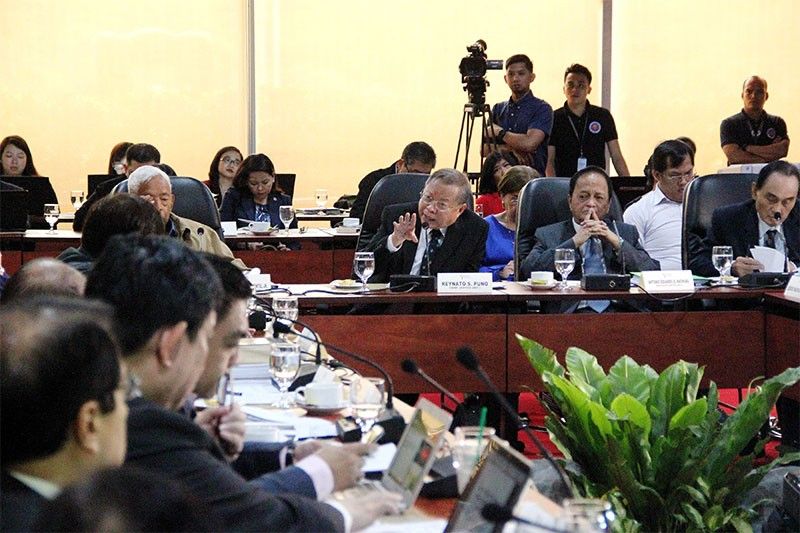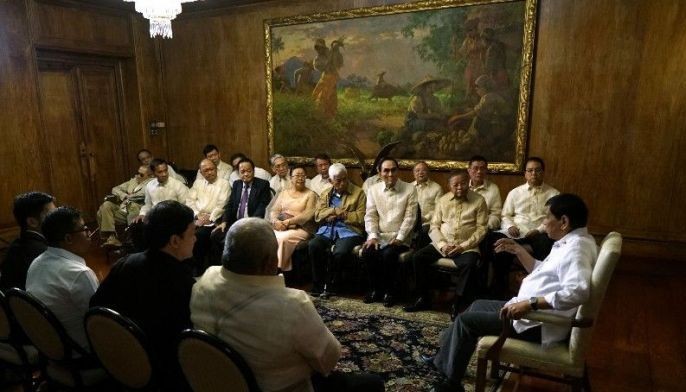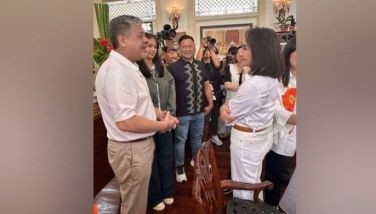How the draft charter distributes power to federated regions

MANILA, Philippines – The Philippines will be divided into 16 federated regions, a Bangsamoro region, and a Federated Region of the Cordilleras that will have exclusive power over certain aspects of governance under the proposed federal constitution.
The central government, meanwhile, will retain its exclusive powers over matters like defense, foreign affairs and international trade.
Under the same proposal, the governments have shared powers that are "within the relative competencies of the Federal Government and Regional Government." The governments can exercise these jointly or separately, but federal power will prevail in case of conflict.
Distribution of powers
Article XII of the draft charter lists the powers that would be exclusive for the central federal government and those that are exclusive to the federated regions.
Federal government
- Defense, security of land, sea and air territory
- Foreign affairs
- International trade
- Customs and tariffs
- Citizenship, immigration and naturalization
- National socio-economic planning
- Monetary policy and federal fiscal policy, banking, currency
- Competition and competition regulation bodies
- Inter-regional infrastructure and public utilities, including telecommunications and broadband networks
- Postal service
- Time regulation, standards of weights and measures
- Promotion and protection of human rights
- Basic education
- Science and technology
- Regulation and licensing of professions
- Social security benefits
- Federal crimes and justice system
- Law and order
- Civil, family, property and commercial laws, except as may be otherwise provided for in the Constitution
- Prosecution of graft and corruption cases
- Intellectual property
- Elections
Federated region
- Socio-economic development and planning
- Creation of sources of revenue
- Financial administration and management
- Tourism, investment and trade development
- Infrastructure, public utilities and public works
- Economic zones
- Land use and housing
- Justice system
- Local government units
Under the Local Government Code, barangays, municipalities, cities and provinces exercise certain powers and responsibilities devolved from the national government, among them the provision of basic services and facilities.
Local governments also currently have the power "to create their own sources of revenues and to levy taxes, fees, and charges which shall accrue exclusively for their use and disposition and which shall be retained by them."
They can also "negotiate and secure financial grants or donations in kind, in support of the basic services or facilities."
Executive
In the existing Local Government Code, the president exercises general supervision over local government units. In the proposed federal constitution, however, the president will only have control over executive departments, bureaus and offices.
The president will also have the executive power of the Federal Republic. The president and vice president will be elected as a team and will both have a term of for years. Both will be eligible for reelection to one term.
The president will have control over all executive departments, bureaus and offices under the federal government. The chief executive will also e the commander-in-chief of the Armed Forces of the Philippines.
Regional governors
The regional governor will serve as the regional executive power. The Regional Assembly will elect the regional governor and the deputy regional governor from its members. They will also have a term of four years subject to one re-election.
The regional governor will have the duty to head the regional government, execute all federal laws applicable in the region and execute all regional laws.
The governor will also appoint heads of executive departments, agencies and bureaus, appoint other officers and employees in the regional government, formulate the expenditure program of the region, and enter into contracts and agreements for the benefit of the region.
Legislature
Congress, consisting of a Senate and a House of Representatives will have federal legislative power. Each federated region should have at least two senators elected by qualified voters. The senators will have four-year terms and may be elected for up to two consecutive terms.
Meanwhile, the House of Representatives will be composed of not more than 400 members, with 60 percent of members will be elected by a plurality of votes, where each single-member legislative electoral district would have one seat in the House.
The remaining 40 percent of the members of the House will be elected nationwide through a system of proportional representation. Members of the House of Representatives will have four-year terms and may serve up to two consecutive terms.
Congress, in a joint session, will have the sole power to declare a state of war by a vote of two-thirds. In times of war, Congress may also authorize the president, for a limited time, to exercise powers necessary to carry out a declared national policy.
Regional Assemblies
A Regional Assembly will act as the legislature of each federated region. This will be composed of elected members, half of whom will come from each province, highly urbanized city and independent chartered city. The other half will be composed of representatives from political parties, which will also be elected by voters of the region.
For the Federated Region of the Cordilleras, the Regional Assembly will be composed of representatives – two from every chartered city, one from every component city, two from every province and, in case of two legislative districts in the province, each district will have one representative.
Judiciary
Judicial power will be vested in the Federal Supreme Court, the Federal Constitutional Court, the Federal Administrative Court, the Federal Electoral Court and in other courts as established by law.
For the federated regions, the Regional Assembly shall provide for a Regional Supreme Court, Regional Appellate Court, Regional Trial Courts and lower courts and special courts in component provinces, cities and municipalities. The assembly will also define the jurisdiction of the regional judiciary in accordance with the Constitution.
The consultative committee, tasked with drafting a new constitution, eyes the removal of the impeachment power of Congress over justices of the Constitutional Court, one of the proposed three Supreme Courts under the draft charter.
READ: Concom eyes 3 supreme courts
Concom proposes that the impeachment of justices in Constitutional Court be decided instead by the 15-member Supreme Court.
The proposed Constitutional Court will have a presiding justice appointed by the Supreme Court and six associate justices with two appointees each from three branches of government.
LIST: Controversial features of proposed federal charter by House sub-committee
— with Edu Punay
The faction of PDP-Laban chaired by former President Rodrigo Duterte has agreed in a meeting earlier today to support Charter change, says Melvin Matibag, the party's secretary-general
— Philstar.com/Xave Gregorio
The House of Representatives votes 301-7 to pass on final reading House Bill 7352 or the proposed Constitutional Convention Act to amend the 1987 Constitution. — Cristina Chi
The House of Representatives approves on second reading House Bill 7352 or the act implementing Resolution of Both Houses No. 6, calling for a constitutional convention to propose amendments to, or revision of, the 1987 Philippine Constitution. — The STAR
With a vote of 301-6 and one abstain, the House of Representatives approves on third and final reading Resolution of Both Houses 6 calling for a constitutional convention. — Cristina Chi
- Latest
- Trending






























